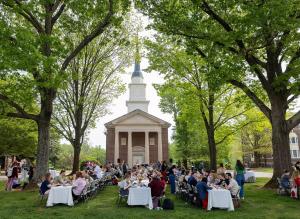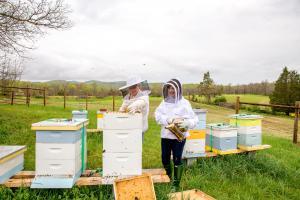Rooted in Sustainability: Sweet Briar College's Campus Community Celebrates Earth Week, Hosts Waxter Environmental Forum
Sweet Briar College honors Earth Week with campus-wide sustainability events and a keynote by author and food systems scholar Dr. Kelly Alexander.
One of the celebration’s highlights was a community-wide lunch hosted by Alumnae Relations and Development, the Center for Human & Environmental Sustainability, and the Sustainability Club on April 24 featuring students and faculty produce and herbs grown on campus. During the lunch, students in the agricultural operations course also sold greenhouse produce and portable reusable bamboo utensil sets. Other events throughout the week included canoe certification and hiking with the Outdoor Program, learning about sustainability issues in the fashion industry with Indie’s Designers, rumba outside with the Sweet Dancers, a bonfire during the Lyrid meteor shower, and paper and collage making with repurposed materials.
The centerpiece of Earth Week was a keynote address by Dr. Kelly Alexander, this year’s Julia B. Waxter Environmental Forum speaker. Dr. Alexander, author of Truffles and Trash: Recirculating Food in a Social Welfare State, spoke to the community on April 29 in Mills Chapel about the six years of research on food waste in Brussels, Belgium, that she completed for the book. During the talk, Dr. Alexander spoke about food waste in restaurants and grocery stores, models for more sustainable practices, and her time learning about the challenges of addressing this global problem. She also participated in a Q&A, book signing, class visits, and meals with campus community members during her time at Sweet Briar.
“The similarities between how we nurture ourselves and what we consider disposable are the same factors. If we can think of them along a spectrum instead of opposites, that would be my hope,” said Dr. Alexander during her keynote presentation.
Dr. Kelly Alexander is an assistant professor and George B. Tindall Fellow of American Studies at the University of North Carolina’s College of Arts and Sciences. She is a James Beard Award-winning writer and former Saveur and Food & Wine magazine editor. Dr. Alexander’s work has appeared in The New York Times, Newsweek, and O: The Oprah Magazine. She also co-authors The New York Times best-selling barbecue cookbook Smokin’ with Myron Mixon.
“The Sweet Briar campus community is so passionate about sustainability. Several recent student projects have addressed food waste. It is something we seek to minimize in our campus food system, so it was perfect to have Dr. Alexander as our Waxter Forum speaker during Earth Week this year,” said Dr. Lisa J. Powell, director of the Center for Human and Environmental Sustainability, associate professor of environmental science and agriculture, and STEM division head.
The Julia B. Waxter Environmental Forum is supported by an endowment established at Sweet Briar by the late Julia Baldwin Waxter ’49 and her husband, Bill. In addition to presenting a public lecture, each forum speaker interacts with environmental science students through class visits, meals, and informal conversations. Dr. Alexander’s visit was also given by Sweet Briar’s Leadership in Sustainable Agriculture and Food Systems certificate and environmental science programs.
Sweet Briar’s commitment to sustainability is more than tradition—it’s a defining part of the student experience. Students learn to lead solutions for a more just and sustainable future through programs like the Center for Human and Environmental Sustainability, the Leadership in Sustainable Agriculture and Food Systems certificate, and a nationally recognized environmental science major. To learn more about studying environmental science at Sweet Briar, contact Admissions at admissions@sbc.edu or call 434-381-6142.
Communications and Marketing
Sweet Briar College
+1 434-381-6262
email us here
Visit us on social media:
LinkedIn
Instagram
Facebook
YouTube
TikTok
X
Legal Disclaimer:
EIN Presswire provides this news content "as is" without warranty of any kind. We do not accept any responsibility or liability for the accuracy, content, images, videos, licenses, completeness, legality, or reliability of the information contained in this article. If you have any complaints or copyright issues related to this article, kindly contact the author above.
DreamSofa Announces $8M Investment in Advanced US Factory Robotics and White-Glove Delivery
Cairokee and Ghostly Kisses Ignite Abadi Al-Johar Arena Stage in an Exceptional Jeddah Season Night
Rick J. Lindsey to Appear on Legacy Makers TV
Więcej ważnych informacji
 Jedynka Newserii
Jedynka Newserii

 Jedynka Newserii
Jedynka Newserii

Konsument

Grupa nowych biednych emerytów stale się powiększa. Ich świadczenie jest znacznie poniżej minimalnej emerytury
Przybywa osób, które z powodu zbyt krótkiego czasu opłacania składek pobierają emeryturę niższą od minimalnej. Tak zwanych nowych biednych emerytów jest w Polsce ok. 430 tys., a zdecydowaną większość grupy stanowią kobiety – wskazują badania ekspertów Instytutu Pracy i Spraw Socjalnych. W ich przypadku krótszy okres składkowy zwykle wynika z konieczności opieki nad dziećmi lub innymi osobami w rodzinie. Wśród innych powodów, wymienianych zarówno przez panie, jak i panów, są także praca za granicą lub na czarno oraz zły stan zdrowia.
Media i PR
M. Wawrykiewicz (PO): Postępowanie z art. 7 przeciw Węgrom pokazało iluzoryczność tej sankcji. Unia wywiera naciski poprzez negocjacje nowego budżetu

Przykład Węgier pokazał, że procedura z artykułu 7 traktatu o UE o łamanie praworządności nie ma mocy prawnej z powodu braku większości, nie mówiąc o jednomyślności wśród pozostałych państw członkowskich. Negocjacje nowego budżetu UE to dobry pretekst do zmiany sposobu części finansowania z pominięciem rządu centralnego. Czerwcowy marsz Pride w Budapeszcie pokazał, że część społeczeństwa, głównie stolica, jest przeciwna rządom Viktora Orbána, ale i na prowincji świadomość konsekwencji działań Fideszu staje się coraz większa przed przyszłorocznymi wyborami.
Firma
Blockchain zmienia rynek pracy i edukacji. Poszukiwane są osoby posiadające wiedzę z różnych dziedzin

Zapotrzebowanie na specjalistów od technologii blockchain dynamicznie rośnie – nie tylko w obszarze IT, ale również w administracji, finansach czy logistyce. Coraz więcej uczelni wprowadza programy związane z rozproszonymi rejestrami, które wyposażają studentów w umiejętności odpowiadające wymogom rynku.
Partner serwisu
Szkolenia

Akademia Newserii
Akademia Newserii to projekt, w ramach którego najlepsi polscy dziennikarze biznesowi, giełdowi oraz lifestylowi, a także szkoleniowcy z wieloletnim doświadczeniem dzielą się swoją wiedzą nt. pracy z mediami.





![Nestlé w Polsce podsumowuje wpływ na krajową gospodarkę. Firma wygenerowała 0,6 proc. polskiego PKB [DEPESZA]](https://www.newseria.pl/files/1097841585/fabryka-nesquik_1,w_85,r_png,_small.png)






.gif)

 |
| |
| |
|